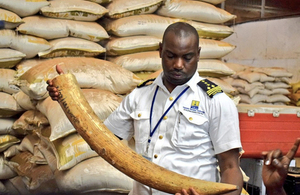UK aid helps stop 750 pieces of illegal ivory being smuggled from South Sudan into Uganda
Technology funded by UK aid has helped the Ugandan Revenue Authority make one of the largest seizures of wildlife contraband the country has ever seen.

Ivory being seized by Ugandan authorities
Thanks to technology funded by the Department for International Development (DFID), the Ugandan Revenue Authority has made one of the largest seizures of wildlife contraband the country has ever seen.
Customs officers in the Northern Ugandan town of Elegu, on the border with South Sudan, seized an estimated 750 pieces of ivory and thousands of pangolin scales, which have a street value of more than £6 million. This enabled a security operation culminating in the arrest of two suspected Vietnamese smugglers.
The software – funded through UK aid - enabled customs officers to profile and scan the cargo which helped to uncover three containers holding the illegal wildlife goods, which the Ugandan Tax Authority estimates killed at least 325 elephants, and thousands of pangolins.
Ugandan customs officers were able to show how logs had been hollowed out and filled with the illegal wildlife goods. The smugglers poured wax inside to make the logs appear hollow and resealed them.
Aside from tackling the illegal wildlife trade, infrastructure at the border provided by UK aid can also help stop other illicit items from crossing borders.
Harriett Baldwin, Minister of State for Africa said:
“This seizure is another example of how UK aid is helping countries to crack down on the illegal ivory trade.”
“Wildlife crime robs communities of their natural resources and livelihoods while deepening poverty and inequality. The UK Government will continue working with our African partners to tackle the underlying issues driving this trade.”
Elephants are one of the most poached mammals for their tusks, but Pangolins (Olugave) are even more sort after for their scales which hold medicinal value in parts of Asia.
The illegal wildlife trade (IWT) presents a persistent problem across Africa with an estimated 100,000 pangolins trafficked from Africa to Asia every year and Tanzania losing 60% of its elephants in half a decade. IWT negatively impacts state revenue, economies, and local communities with more than £70bn per year lost due to crimes affecting natural resources. It is one of the most lucrative forms of trafficking along with drugs and weapons.
By working with affected governments wildlife can be used as an engine for tourism, job creation and sustainable development. DFID is helping to tackle the underlying issues driving the trade. Last October we announced £6 million to protect iconic and endangered species including rhinos, elephants and pangolins. We are also are introducing innovative new farming techniques and climate-smart crops which provide far more yield – providing sustainable, more lucrative alternatives to poaching.
General media queries (24 hours)
Email [email protected]
Telephone 020 7023 0600
If you have an urgent media query, please email the DFID Media Team on [email protected] in the first instance and we will respond as soon as possible.